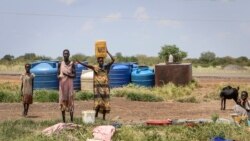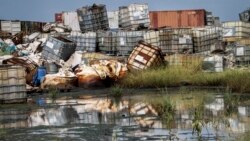The oil industry in South Sudan has left land with hundreds of open holes containing poison waste. In the water and soil, there are poisonous chemicals and heavy metals including mercury, manganese and arsenic. The Associated Press is now making public four environmental reports on the situation in South Sudan.
The reports tell of shocking birth defects, stillbirths and other health issues among people living in the area, as well as among soldiers who have been stationed there. Locals say many women are unable to get pregnant. Women who do get pregnant often see it end too early or give birth to babies born with severe problems.
Abui Mou Kueth’s young son, Ping, was born with six fingers on both hands, one leg that did not grow, a misshapen foot and problems with a kidney. “I was shocked the first time I saw the baby,” she said, holding him in her arms. She said he was not able to breastfeed. She instead needed to give Ping special liquid food. “I am worried about his future,” the mother said.
Oil companies and South Sudan’s ministry of petroleum received the reports as far back as 2013. But they hid them, four people with close knowledge of the oil operations and the documents told the AP. All four people spoke without giving names for fear of their safety.
Egbert Wesselink works with PAX, a Dutch-based human rights organization. He said, “South Sudan is running one of the dirtiest and poorest managed oil operations on the planet.”
Silencing those who report the problem
The states of Upper Nile and Unity are oil-rich areas in the north of the country. The area borders Ethiopia and Sudan.
The reports do not show a direct link between the pollution and the health problems. But community leaders and lawmakers say South Sudan’s government and the two main oil companies -- the Chinese-led Dar Petroleum Operating Co. and the Greater Pioneer Operating Co. -- have ignored the issue. They also have reportedly tried to silence those who have tried to publicize the problem.
Government officials and security forces working with the oil companies held an AP reporter, Sam Mednick, for 11 days when he tried to report the story. They looked at what he had on his phone and computer and threatened to put him in jail. Last October, Mednick was asked to leave the country.
Unknown diseases
The reports show that the government and the oil companies knew about the pollution and the severe health problems it was causing in the nearby population. But little has been done, locals say, to clean up the mess. Again and again, officials have broken promises to deal with the pollution, they say.
Simon Ngor is a religious leader in Melut, a small village in the oil-rich area of Upper Nile state. “People are dying of unknown diseases,” he said. “The oil company says they’re working on it but I don’t think they actually are.”
Lost children
“We’re losing children,” said Nyaweir Ayik Monyuak, chairman of the Women’s Association in Melut. The 43-year-old mother lost two children of her own between 2008 and 2011.
Many of the locals say the health problems got worse after people started drinking water from white containers that began appearing several years ago in markets and along roadsides.
There are many of those same containers in a Dar Petroleum chemical junkyard, with signs saying they contained a chemical called Phasetreat. The oil company used the chemical during drilling to separate oil from water.
Oil is a main industry in South Sudan
Environmental experts say there is little reason for international companies to do anything; it is easy for them to do whatever they want in poor countries like South Sudan.
That may be because the country needs its oil sector to survive.
Almost all the country’s exports and more than 40 percent of its gross domestic product come from oil, the World Bank says.
Luke Patey is a senior researcher studying China’s oil investments in Africa at the Danish Institute for International Studies. He said, “No one’s really watching. The government is neither willing nor able to monitor and enforce its own environmental laws.”
The result, he added, is a severe “cycle of negligence.”
I’m Jill Robbins.
Sam Mednick reported on this story for the Associated Press.
Jill Robbins adapted it for Learning English. Ashley Thompson was the editor.
_______________________________________________
Words in This Story
birth defect – n. any physical, mental, or biochemical abnormality present at birth
stillbirth - n. the birth of a dead baby
manage – v. to have control of something, such as a business, department, or sports team
gross domestic product – n. the total value of the goods and services produced by the people of a nation during a year not including the value of income earned in foreign countries
monitor – v. to watch, observe, listen to, or check (something) for a special purpose over a period of time
negligence – n. lack of normal care or attention
What do you think of the pollution resulting from the oil industry? We want to hear from you. Write to us in the Comments Section.







